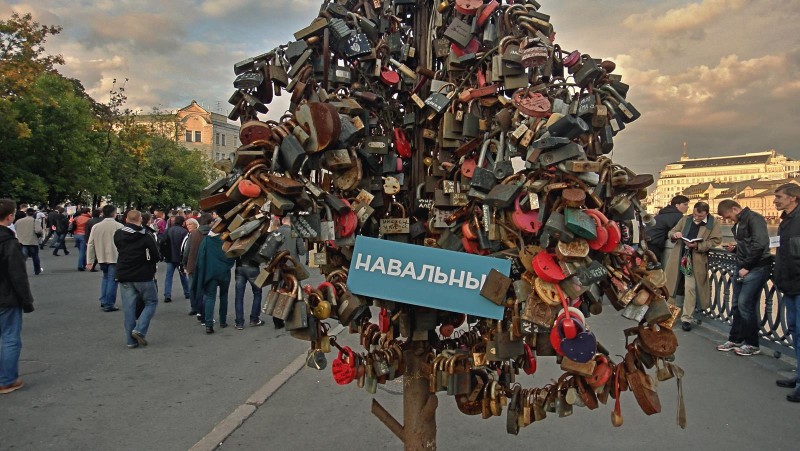His admirers compare him to Mahatma Gandhi. His adversaries say he’s more like a young Nelson Mandela. Journalists in Russia and around the world leap on his every tweet. Today, he walked outside and bought some milk (defying house arrest), and The Guardian promptly wrote [2] about it.
People say many things about Putin-critic Alexey Navalny, but calling him a nobody is plainly not an option.
Navalny is now the unlucky owner of two suspended criminal sentences. He got his second one, three-and-a-half years for supposedly defrauding a cosmetics company, last week, leading to a small, but much anticipated rally in downtown Moscow, just outside the Kremlin, at Manezh Square. The same court sent his brother Oleg to prison (no “suspended sentence”), also for three-and-a-half years.
It’s a bit tricky trying to count how many times Alexey Navalny has broken the terms of his house arrest. Last week, he left his apartment altogether and rode the subway to downtown, where he tried (and failed) to attend the rally at Manezh Square. There’s also every indication that Navalny has been authoring his own tweets and blog posts for months now, which is a no-no under the conditions of his house arrest.
Finally, this week, Navalny “threw down the gauntlet [3]” and sliced off his location-monitoring ankle bracelet. Then he granted interviews to Russia’s independent media, describing the removal of his ankle bracelet. Prison authorities hurried to his apartment, where they photographed Navalny’s carving work and departed, leaving the monitoring device where they found it. The next day, when Navalny walked outside and visited a grocery store, to stock up on milk, three ununiformed men (police officers, presumably) escorted him home.
Да ни фига себе. https://t.co/d10cLLiOm8 [4] pic.twitter.com/AlOSbQLyb6 [5]
— Alexey Navalny (@navalny) January 6, 2015 [6]
Well how do you like that!
Online, Russians have watched Navalny’s house arrest saga, praising his courage against tyranny and, alternatively, mocking his thirst for attention. Navalny insists there are no legal grounds for his continued house arrest. Citing two Russian criminal codes (107 and 311), he says [7] the law makes him a free man, now that he’s been sentenced.
Writing on Facebook today, Murad Musaev challenged [8] Navalny’s interpretation of the law. Musaev is best known [9] outside Russia as the lawyer who defended (and helped acquit) the men accused of organizing and abetting the murder of journalist Anna Politkovskaya. Today, he is the lawyer saying Navalny’s portrayal of his house arrest is “based more on emotions than legal norms.”
According to Musaev, Criminal Code 311 requires that defendants be released from captivity after a verdict is rendered, but doesn’t apply to house arrest, which can remain in effect until a verdict enters force. (Navalny’s verdict won’t enter force until the conclusion of an appeals process that hasn't yet begun.) Musaev also accused Navalny of misinterpreting Criminal Code 107, which Navalny says frees him from house arrest because he’s no longer legally considered an “accused offender” after his verdict. Not so, says Musaev, who cites another criminal code specifying that Navalny remains “accused,” again, until his verdict enters force.
Russia’s prison authorities seem to share Musaev’s understanding of the criminal codes, and they’ve complained twice already to a Moscow court about Navalny’s house-arrest violations. The courts, however, have turned away [10] police both times. Why?
Musaev has an explanation for this, too, saying Navalny has slipped into a sort of legal limbo, where his house arrest remains in effect, but the court responsible for confining him to his apartment is powerless to consider violations of his arrest, now that a verdict has been rendered.
So police keep escorting him home, and the court keeps shrugging. Navalny can repeat this caper as many times as he likes, until either police charge him with a new crime, or his suspended sentence enters force.
“So Navalny’s gesture proved effective,” Musaev writes, “and it was practically risk-free.”
